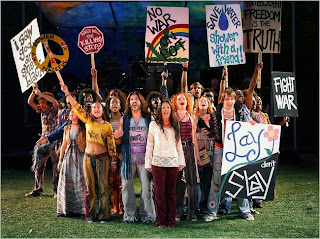Hair in the Park
 Last year I wrote about the fortieth anniversary of the musical Hair and how obsessed I am with it. At the time I thought I would never see a revival of it, let alone a professional one, but I was gobsmacked to read earlier this summer that the New York Shakespeare Festival, which mounted the original production, was going to do it as part of their summer program of free theater outdoors at the Delacorte in Central Park.
Last year I wrote about the fortieth anniversary of the musical Hair and how obsessed I am with it. At the time I thought I would never see a revival of it, let alone a professional one, but I was gobsmacked to read earlier this summer that the New York Shakespeare Festival, which mounted the original production, was going to do it as part of their summer program of free theater outdoors at the Delacorte in Central Park.So of course I had to go. When I lived closer to New York I used to go to Shakespeare in the Park all the time. All it requires is getting there early enough to take your place in line and then waiting patiently until they hand the tickets out. Since moving farther away, though, I have only done it a couple of times, but nothing was keeping me from this.
My friend Bob and I left his house in northern New Jersey at about six and got in line about 7:15 AM, and there were already a few hundred people in line. Clearly a musical about hippies that is over forty still can resonate with New York audiences, as when we settled into our seats at just before eight there was a full house.
As I watched the show I felt as if I were in a golden glow, a kind of unreal feeling. The production was magnificent, completely faithful to the original, without a hint that it was forty years later. I savored every moment of it, every note of the music, every tie-dye shirt and bandanna of the costumes, every peace sign. When it was over I could have stayed to watch them do it all over again, and if I lived in New York I would certainly see it several times.
The production was directed by Diane Paulus, and in the notes in the Playbill she discusses how she resisted updating it, exchanging Iraq mentions for Vietnam, etc., and that was the correct decision. Certainly this show has more relevance to audiences when the country is in the midst of an unpopular war, so it's not lost on the spectators, and hammering home these parallels by monkeying with the mixture would be too jarring.
The story is very simple, and the "non-book" as it was referred to, is the weakest part of the show. It has a kind of sketch format, as each of the major characters are introduced by a song--there's the "fury with the fringe on top," George Berger, who has been kicked out of high school, the pansexual Woof, who sings an ode to alternative sexual practices, "Sodomy," Hud, the militant black man who sings an long list of derogatory terms for his race called "Colored Spade," Sheila, a radical college student, and Jeannie, a pregnant hippie-chick who is in love with Claude, who is from Flushing but fancies himself as hailing from Manchester, England. Sheila is in love with George, and Woof is in love with Mick Jagger. If the book isn't exactly cracklingly good, I did like one joke, which I'm not sure was in the original. Jeannie, when about to take a puff on a joint, announces, "As Mary Magdalene said, 'Jesus, I'm getting stoned!'"
The through-line of the piece is that Claude has received his draft notice. He is urged to not report, but does anyway, and then to burn his draft card, but he does not. Claude's slow slide into the maw of the military is the spine of the action. Though much of Hair is bright and spritely with optimism--is there any cheerier opening than Aquarius, and what could be more enchanting than Good Morning, Starshine, there is an overall sense of anger and mourning to the lyrics. These kids, some of whom have no other home but the park, are completely at a loss, and sing about a "dying nation," or a litany of things they don't have, from faith to underwear. Paulus gets that, and though the evening ends with the cast dancing on stage with the audience members, the last moment of the play itself is the song "Let the Sunshine In," which is not a happy hosanna but instead a plaintive cry for salvation.
One of the best things about doing a professional production of Hair is that you're going to see a lot of bright young talent. There are no star turns, so everyone in the cast was quite unknown to me. I hesitate on mentioning anyone in particular, since the cast was uniformly excellent, but I can single out Bryce Ryness as Woof, Will Swenson as Berger, Caren Lyn Manuel as Sheila, and Christopher J. Hanke as Claude. It was really a magical evening for me, and I thank them all for realizing a dream come true.


Comments
Post a Comment